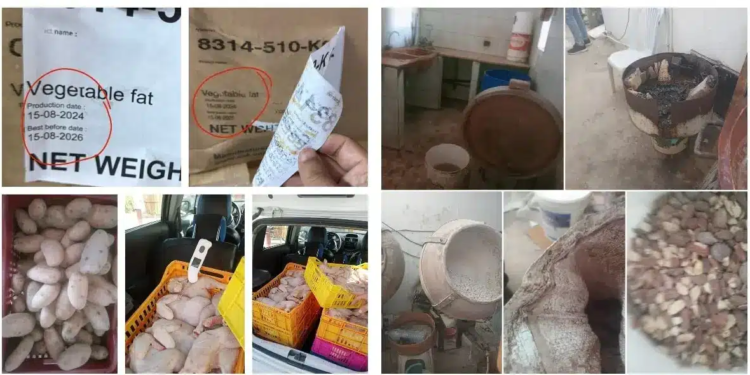During the first week of November 2025, the National Food Safety Authority (INSSPA) seized more than 14 tonnes and 690 liters of food deemed unfit for consumption.
A significant figure, without however reaching the record volumes observed before the month of Ramadan 2023 – more than 108 tonnes in a single week – but which testifies to a strong return to controls and increased vigilance in the face of the proliferation of the informal market.
Targeted seizures, a territory under surveillance
The operations carried out in the governorates of Sfax, Kairouan, Manouba, Bizerte, Nabeul and Le Kef map a fragile and heterogeneous food chain.
In Sfax, the central team uncovered more than 11 tons of expired cocoa and vegetable fats, repackaged with falsified expiry dates and labels torn off to hide the origin.
Still in the same governorate, regional controllers discovered more than 500 kg of potatoes and dried fruits infested with insects, stored in a warehouse without ventilation.
In Kairouan, mixed brigades seized nearly 300 liters of milk and raib, 100 kg of dried red pepper covered in dust and rodents, as well as 165 kg of rotten meat. Three fast food restaurants were closed for non-compliance with health standards.
In Kef, more than 900 kg of rotten vegetables and fruits – onions, dates, artisanal harissa – and more than 300 soft drinks containing banned colorings (E102) were withdrawn from the market.
In Manouba, an illegal slaughterhouse housing 299 live poultry and 265 already slaughtered was shut down, while in Bizerte, more than 760 kg of poultry meat was confiscated at an illegal sales point.
Finally, in Nabeul, nearly 100 liters of expired vegetable oil were seized in a warehouse where humidity, mold and the presence of rodents reigned.
These simultaneous interventions reflect a tightening of the action of the INSSPA, now extended to the entire territory, in conjunction with the National Guard brigades and regional prosecutors’ offices.
Ordinary fraud and survival economy
Behind the dusty warehouses and improvised workshops, a gray economy has become a system.
In a context of persistent inflation, some operators relabel, recycle, or falsify expiration dates to maintain their margins.
The INSSPA, which is multiplying raids, is coming up against fraud that has become routine, fueled by economic tolerance and judicial slowness.
Between official circuits and the informal market, the boundaries are dissolving: questionable products return to the shelves faster than they are removed.
Also read:
Tunisia – Speculation: 134 control campaigns in 24 hours
Tunisia – Mouled: 15 tonnes of unsuitable products seized by INSSPA








